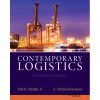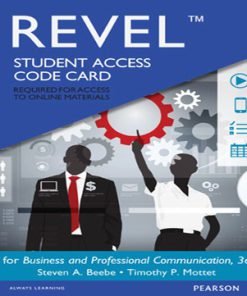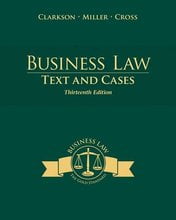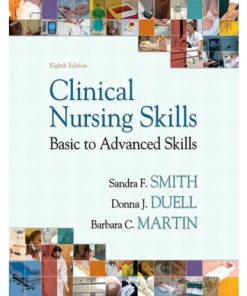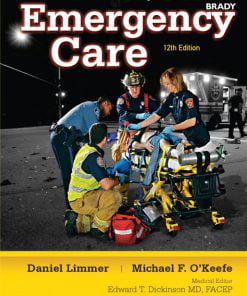Test Bank for The Legal Environment of Business, 8th Edition: Frank B. Cross
$35.00 Original price was: $35.00.$26.50Current price is: $26.50.
Test Bank for The Legal Environment of Business, 8th Edition: Frank B. Cross
This is completed downloadable of Test Bank for The Legal Environment of Business, 8th Edition: Frank B. Cross
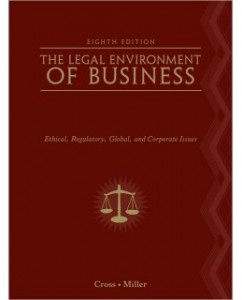
Product Details:
- ISBN-10 : 0538453990
- ISBN-13 : 978-0538453998
- Author: Frank B. Cross
Comprehensive, authoritative, and cutting-edge, THE LEGAL ENVIRONMENT OF BUSINESS combines a classic “black letter law” approach with an interesting and accessible reader-friendly format. The cases, content, and features of the exciting new Eighth Edition have been thoroughly updated to represent the latest developments in the business law environment. An excellent assortment of included cases ranges from precedent-setting landmarks to important recent decisions, and ethical, global, and corporate themes are integrated throughout. In addition, numerous features and exercises help you master key concepts and apply what you’ve learned to real-world issues, and the book offers an unmatched range of support resources–including innovative online review tools.
Table contents:
- Part One Introduction to the Law and the Legal Environment of Business
- Chapter One Critical Thinking and Legal Reasoning
- The Importance of Critical Thinking
- A Critical Thinking Model
- The Critical Thinking Steps
- Facts
- Issue
- Reasons and Conclusion
- Rules of Law
- Ambiguity
- Ethical Norms
- Analogies
- Missing Information
- Using Critical Thinking to Make Legal Reasoning Come Alive
- Legal Reasoning
- Applying the Critical Thinking Approach
- Assignment on the Internet
- On the Internet
- For Future Reading
- Chapter Two Introduction to Law and the Legal Environment of Business
- Critical Thinking About The Law
- Definition of the Legal Environment of Business
- Definition of Law and Jurisprudence
- Natural Law School
- Positivist School
- Sociological School
- American Realist School
- Critical Legal Studies School
- Feminist School
- Law and Economics School
- Sources of Law
- The Legislature as a Source of Statutory Law
- The Judicial Branch as a Source of Case Law
- Case Law Precedents and the Internet
- Restatements of the Law
- The Executive Branch as a Source of Law
- Treaty Making
- Executive Orders
- Administrative Agencies as a Source of Law
- Classifications of Law
- Criminal Law and Civil Law
- Public and Private Law
- Substantive and Procedural Law
- Substantive Law
- Procedural Law
- Cyberlaw
- Global Dimensions of the Legal Environment of Business
- Summary
- Review Questions
- Review Problems
- Case Problems
- Thinking Critically About Relevant Legal Issues
- Assignment On The Internet
- On The Internet
- For Future Reading
- Chapter Three The American Legal System
- Jurisdiction
- Original versus Appellate Jurisdiction
- Critical Thinking about the Law
- Jurisdiction over Persons and Property
- In Rem Jurisdiction
- Subject Matter Jurisdiction
- State Jurisdiction
- Exclusive Federal Jurisdiction
- Concurrent Federal Jurisdiction
- Critical Thinking about the Law
- Venue
- The Structure of the Court System
- The Federal Court System
- Federal Trial Courts
- Intermediate Courts of Appeal
- Court of Last Resort
- State Court Systems
- State Trial Courts
- Intermediate Courts of Appeal
- Courts of Last Resort
- The Actors in the Legal System and Their Relationship to the Business Community
- The Attorney
- Attorney–Client Privilege
- Additional Functions of the Attorney
- The Judge
- The Power of Judicial Review
- The Jury
- Petit Juries
- Grand Juries
- The Adversary Process
- Criticisms of the Adversary System
- Steps in Civil Litigation and the Role of Businesspersons
- The Pretrial Stage
- Informal Negotiations
- Initiation of a Legal Action
- Service of Process
- Defendant’s Response
- Pretrial Motions
- Discovery
- Pretrial Conference
- The Trial
- Jury Selection
- Critical Thinking About The Law
- Opening Statements
- Plaintiff’s Case
- Defendant’s Case
- Conference on Jury Instructions
- Closing Arguments
- Posttrial Motions
- Appellate Procedure
- Appeal to the U.S. Supreme Court
- Class Actions
- Global Dimensions of the American Legal System
- Summary
- Review Questions
- Review Problems
- Case Problems
- Thinking Critically about Relevant Legal Issues
- The Election of Judges
- Assignment On The Internet
- On The Internet
- For Future Reading
- Chapter Four Alternative Tools of Dispute Resolution
- Critical Thinking about the Law
- Negotiation and Settlement
- Mediation
- Selection of a Mediator
- Common Uses of Mediation
- Advantages of Mediation
- Criticisms of Mediation
- Arbitration
- Justice Souter
- Case Questions
- Methods of Securing Arbitration
- Justice Stratton
- Critical Thinking about the Law
- Justice Scalia
- Critical Thinking about the Law
- Selection of an Arbitrator
- Common Uses of Arbitration
- Problems with Arbitration
- Minitrials
- Early Neutral Case Evaluation
- Private Trials
- Summary Jury Trials
- Court-Annexed Alternative Dispute Resolution
- Use of Court-Annexed ADR in the State and Federal Systems
- Differences between Court-Annexed and Voluntary ADR
- Arbitration
- Mediation
- The Future of Alternative Dispute Resolution
- Global Dimensions of Alternative Dispute Resolution
- Justice Blackmun
- Summary
- Review Questions
- Review Problems
- Case Problems
- Thinking Critically About Relevant Legal Issues
- Arbitration in the Malpractice Arena
- Assignment On The Internet
- On The Internet
- For Future Reading
- Chapter Five Constitutional Principles
- The Constitution
- Federalism
- Critical Thinking About The Law
- Supremacy Clause
- Federal Preemption
- Separation of Powers
- The Impact of the Commerce Clause on Business
- The Commerce Clause as a Source of Federal Authority
- Critical Thinking About The Law
- The Commerce Clause as a Restriction on State Authority
- The Taxing and Spending Powers of the Federal Government
- Taxation of the Internet?
- The Impact of the Amendments on Business
- The First Amendment
- Corporate Commercial Speech
- Critical Thinking About The Law
- Corporate Political Speech
- The Fourth Amendment
- The Fifth Amendment
- The Fourteenth Amendment
- Standard of Review
- SUMMARY
- Review Questions
- Review Problems
- Case Problems
- Thinking Critically About Relevant Legal Issues
- Protection of Corporate Political Speech
- Assignment On The Internet
- On The Internet
- For Future Reading
- Chapter Six White-Collar Crime and the Business Community
- Critical Thinking About The Law
- Crime and Criminal Procedure
- Crime
- Criminal Procedure
- The Miranda Warnings
- Booking and First Appearance
- Information or Indictment
- Plea Bargaining
- Burden of Proof
- Defenses
- Distinguishing Features of White-Collar Crime
- The Corporation as a Criminal
- Arguments in Support of Corporate Liability
- Arguments in Opposition to Corporate Liability
- Imposition of Liability on Corporate Executives
- Critical Thinking About The Law
- Imposition of Liability on Lower-Level Corporate Criminals
- Factors Encouraging the Commission of White-Collar Crime
- Sentencing of White-Collar Criminals
- Common White-Collar Crimes
- Bribery
- Violations of Federal Regulations
- Criminal Fraud
- Critical Thinking About The Law
- Larceny
- Embezzlement
- Computer Crimes
- Destruction of Data
- Unlawful Appropriation of Data or Services
- Entering of Fraudulent Records or Data into a Computer System
- Financial Crimes
- Prevention of White-Collar Crime
- Federal Laws Used in the Fight against White-Collar Crime
- The Racketeer Influenced and Corrupt Organizations Act (RICO)
- False Claims Act
- Sarbanes-Oxley Act
- Whistleblower Protection Act
- State Laws Used in the Fight against White-Collar Crime
- Global Dimensions of White-Collar Crime
- SUMMARY
- Review Questions
- Review Problems
- Case Problems
- Thinking Critically About Relevant Legal Issues
- Allocating Blame for White-Collar Crime
- Assignment On The Internet
- On The Internet
- For Future Reading
- Chapter Seven Ethics, Social Responsibility, and the Business Manager
- Critical Thinking About The Law
- Definition of Business Ethics and the Social Responsibility of Business
- Business Ethics
- The Social Responsibility of Business
- Theories of Ethical Thought
- Consequential Theories
- Deontological Theories
- Humanist Theories
- Codes of Ethics
- Individual Codes of Ethics
- Corporate Codes of Ethics
- Corporate Ethics
- Industry Codes of Ethics
- Professional Codes of Ethics
- Accounting
- Insurance and Finance
- Law
- Schools of Social Responsibility
- Profit-Oriented School
- Managerial School
- Institutional School
- Professional Obligation School
- Regulation School
- Global Dimensions of Ethics and Social Responsibility
- Code of Conduct for Transnational Corporations
- Summary
- Review Questions
- Review Problems
- Case Problems
- Thinking Critically About Relevant Legal Issues
- Disbarment of Lawyers and Debarment of Officers and Directors of Corporations
- Potential Debarment of Officers and Directors
- Assignment On The Internet
- On The Internet
- For Future Reading
- Chapter Eight The International Legal Environment of Business
- Critical Thinking About The Law
- Dimensions of the International Environment of Business
- Political Dimensions
- Economic Dimensions
- Cultural Dimensions
- Corruption and Trade
- Critical Thinking About The Law
- Legal Dimensions
- National Legal Systems
- Selected National Legal Systems
- International Law
- Methods of Engaging in International Business
- Trade
- International Licensing and Franchising
- Foreign Direct Investment
- Critical Thinking About The Law
- Risks of Engaging in International Business
- Expropriation of Private Property
- Sovereign Immunity Doctrine
- Critical Thinking About The Law
- Act-of-State Doctrine
- Export and Import Controls
- Export Controls
- Import Controls
- Legal and Economic Integration as a Means of Encouraging International Business Activity
- The World Trade Organization
- Purpose and Terms
- General Impact
- Impact on Corporate Investment Decision Making
- The European Union
- Purpose
- Structure
- Impact
- Unity of Law
- Economic Integration
- Political Union
- North American Free Trade Agreement
- Purpose
- Structure
- Trade Commission
- Secretariat
- Arbitral Panels
- Impact
- Global Dispute Resolution
- Arbitration
- Litigation
- Globalization: Hurts or Helps
- Summary
- Review Questions
- Review Problems
- Case Problems
- Thinking Critically About Relevant Legal Issues
- Assignment On The Internet
- On the Internet
- For Future Reading
- Part Two Private Law and the Legal Environment of Business
- Chapter Nine The Law of Contracts and Sales—I
- Critical Thinking About The Law
- Definition, Sources, and Classifications of Contract Law
- Definition
- Sources of Contract Law
- Case Law
- Uniform Commercial Code
- Classifications of Contracts
- Express and Implied Contracts
- Unilateral and Bilateral Contracts
- Critical Thinking About The Law
- Void, Voidable, and Valid Contracts
- Executed and Executory Contracts
- Quasi-Contract
- Elements of a Legal Contract
- Legal Offer
- Methods of Termination of an Offer
- Rejection by the Offeree
- Revocation by the Offeror
- Legal Acceptance
- Intent to Accept
- Communication of Acceptance
- Critical Thinking About The Law
- Satisfying, or “Mirroring,” the Terms of the Offer
- Internet and E-Contracts: Acceptance Online
- Consideration
- Adequacy of Consideration
- Preexisting Duty Rule
- Promises Enforceable without Consideration
- Liquidated and Unliquidated Debts
- Genuine Assent
- Fraud
- Duress
- Critical Thinking About The Law
- Undue Influence
- Mistake
- Competent Parties
- Minors
- Insanity
- Intoxication
- Legal Object
- Statutory Law
- Case Law
- Contracts That Must Be in Writing
- Contracts for the Sale of an Interest in Land
- Contracts to Pay the Debts of Another
- Contracts Not Performable in One Year
- Sale of Goods of $500 or More
- Nonbusiness Contracts
- Parol Evidence Rule
- Third-Party Beneficiary Contracts and Assignment of Rights
- Types of Third-Party Beneficiary Contracts
- Assignment of Rights
- Summary
- Review Questions
- Review Problems
- Case Problems
- Thinking Critically about Relevant Legal Issues
- On The Internet
- For Future Reading
- Chapter Ten The Law of Contracts and Sales—II
- Critical Thinking About The Law
- Methods of Discharging a Contract
- Discharge By Performance
- Uniform Commercial Code and Performance and Convention on International Sale of Goods
- Discharge By Mutual Agreement
- Discharge by Conditions Precedent and Subsequent
- Condition Precedent
- Condition Subsequent
- Discharge By Impossibility of Performance
- Discharge By Commercial Impracticability
- Contracts with the Government and the Sovereign Acts Doctrine
- Remedies for a Breach of Contract
- Monetary Damages (“Legal” Remedies)
- Compensatory Damages
- Punitive Damages
- Nominal Damages
- Liquidated Damages
- Critical Thinking About The Law
- Equitable Remedies
- Rescission
- Reformation
- Specific Performance
- Injunctions
- Remedies for Breach of a Sales Contract (Goods)
- Remedies for the Seller
- Remedies for the Buyer
- E-Contracts
- E-Signatures
- The Uniform Computer Information Transaction Act
- Scope of the UCITA
- The Business Community: Criticisms of the UCITA
- Global Dimensions of Contract and Sales Law
- Summary
- Review Questions
- Review Problems
- Case Problems
- Thinking Critically about Relevant Legal Issues
- Assignment On The Internet
- On The Internet
- For Future Reading
- Chapter Eleven The Law of Torts
- The Goals of Tort Law
- Critical Thinking About The Law
- Damages Available in Tort Cases
- Compensatory Damages
- Nominal Damages
- Punitive Damages
- Classifications of Torts
- Intentional Torts
- Intentional Torts against Persons
- Assault and Battery
- Defenses to Battery
- Defamation
- Critical Thinking About The Law
- Defenses to Defamation
- Privacy Torts
- False Imprisonment
- Intentional Infliction of Emotional Distress
- Intentional Torts against Property
- Intentional Torts against Economic Interests
- Negligent Torts
- Elements of Negligence
- Defenses to Negligence
- Strict Liability Torts
- Global Dimensions of Tort Law
- Summary
- Review Questions
- Review Problems
- Case Problems
- Thinking Critically about Relevant Legal Issues
- Assignment On The Internet
- On The Internet
- For Future Reading
- Chapter Twelve Product and Service Liability Law
- Critical Thinking About The Law
- Theories of Recovery in Product Liability Cases
- Negligence
- The Privity Limitation
- Negligent Failure to Warn
- Negligent Design
- Negligence per se
- Defenses to a Negligence-Based Product Liability Action
- Strict Liability in Contract for Breach of Warranty
- Implied Warranty of Merchantability
- Critical Thinking About The Law
- Implied Warranty of Fitness for a Particular Purpose
- Express Warranties
- Defenses to Breach-of-Warranty Actions
- Strict Liability in Tort
- Impact of the Restatement (Third) of Torts
- 402A
- Defenses to a Strict Product Liability Action
- Liability to Bystanders
- Market Share Liability
- Service Liability
- Accountants’ Liability
- Global Dimensions of Product Liability Law
- Summary
- Review Questions
- Review Problems
- Case Problems
- Thinking Critically about Relevant Legal Issues Government Protection against Unsafe Products
- Assignment On The Internet
- On The Internet
- For Future Reading
- Chapter Thirteen Law of Property: Real and Personal
- Critical Thinking About The Law
- Real Property
- Definition of Real Property
- Fixtures
- Extent of Ownership
- Interests in Real Property
- Fee Simple Absolute
- Conditional Estate
- Life Estate
- Future Interest
- Leasehold Estates
- Easements
- License
- Co-Ownership
- Condominiums and Cooperatives
- Condominiums
- Critical Thinking About The Law
- Cooperatives
- Voluntary Transfer of Real Property
- Execution
- General Warranty Deed
- Quitclaim Deed
- Delivery
- Acceptance
- Recording
- Involuntary Transfer of Real Property
- Adverse Possession
- Condemnation
- Restrictions on Land Use
- Restrictive Covenants
- Zoning
- Other Statutory Restrictions on Land Use
- Personal Property
- Voluntary Transfer of Personal Property
- Involuntary Transfers of Personal Property
- Bailments
- Global Dimensions of Property Law
- Summary
- Review Questions
- Review Problems
- Case Problems
- Thinking Critically about Relevant Legal Issues Eminent Domain and Democracy
- Assignment On The Internet
- On The Internet
- For Future Reading
- Chapter Fourteen Intellectual Property
- Introduction to Intellectual Property
- Trademarks
- Critical Thinking About The Law
- Critical Thinking About The Law
- Trade Dress
- Federal Trademark Dilution Act of 1995
- Patents
- Trade Secrets
- Economic Espionage Act
- Copyrights
- Fair Use Doctrine
- Copyrights in the Digital Age
- Software and the Copyright Act of 1976
- The No Electronic Theft Act of 1997
- The Digital Millennium Copyright Act
- File-Sharing Networks and Technologies
- Global Dimensions of Intellectual Property Law
- Summary
- Review Questions
- Review Problems
- Case Problems
- Thinking Critically about Relevant Legal Issues A Question under TRIPS
- Assignment On The Internet
- On The Internet
- For Future Reading
- Chapter Fifteen Agency Law
- Critical Thinking About The Law
- Definition and Types of Agency Relationships
- Definition of Agency
- Types of Agency Relationships
- Principal–Agent
- Employer–Employee
- Employer–Independent Contractor
- Critical Thinking About The Law
- Creation of an Agency Relationship
- Expressed Agency or Agency By Agreement
- Agency By Implied Authority
- Critical Thinking About The Law
- Agency through Ratification by Principal
- Agency By Estoppel or Apparent Authority
- Duties of Agents and Principals
- Principal’s Duties to Agent
- Duty of Compensation
- Duty of Reimbursement and Indemnification
- Duty of Cooperation
- Duty to Provide Safe Working Conditions
- Agent’s Duties To Principal
- Duty of Loyalty
- Duty of Obedience
- Duty of Accounting
- Duty of Performance
- Principal’s and Agent’s Liability to Third Parties
- Contractual Liability
- E-Commerce: Intelligent Agents
- Liability of Disclosed, Partially Disclosed, and Undisclosed Principals
- Liability of Undisclosed Principal
- Tort Liability
- Tort Liability and Negligence
- Criminal Liability
- Termination of the Principal–Agent Relationship
- Termination By Agreement
- Termination By Operation of Law
- Critical Thinking About The Law
- Global Dimensions of Agency Law
- Japan
- European Union
- U.S. Agents Abroad
- Summary
- Review Questions
- Review Problems
- Case Problems
- Thinking Critically about Relevant Legal Issues
- Assignment On The Internet
- On The Internet
- For Future Reading
- Chapter Sixteen Law and Business Associations—I
- Critical Thinking About The Law
- Factors Influencing a Business Manager’s Choice of Organizational Form
- Some Common Forms of Business Organization in the United States
- Sole Proprietorships
- General Partnerships
- Creating a Partnership
- Relationship between Partners
- Critical Thinking About The Law
- Terminating a Partnership
- Limited Partnerships and Limited Liability Limited Partnerships
- Limited Liability Limited Partnership
- Specialized Forms of Business Associations
- Joint Stock Company
- Syndicate
- Joint Venture
- Franchising
- Laws Governing Franchising
- Federal Laws
- State Laws
- Internet Franchising
- Global Dimensions of Business Associations
- Outsourcing
- Summary
- Review Questions
- Review Problems
- Case Problems
- Thinking Critically about Relevant Legal Issues
- Assignment On The Internet
- On The Internet
- For Future Reading
- Chapter Seventeen Law and Business Associations—II
- The Corporation
- Critical Thinking About The Law
- Classification of Corporations
- Closely Held Corporation
- Publicly Held Corporation
- Multinational or Transnational Corporation
- Subchapter S Corporation
- Robs Corporation
- Professional Corporation
- Nonprofit Corporation
- Creation of Corporations
- Financing of Corporations
- Debt Financing
- Unsecured Bonds
- Secured Bonds
- Income Bonds
- Convertible Bonds
- Callable Bonds
- AAA Bonds and Junk Bonds
- Equity Financing
- Classes of Stock
- Consideration
- Operation of Corporations
- The Role of the Shareholders
- The Role of the Board of Directors
- The Role of the Officers and Managers
- Fiduciary Obligations of Directors, Officers, and Managers
- Critical Thinking About The Law
- Limited Liability Companies
- The Uniform Limited Liability Act
- LLC Characteristics
- Creating a Limited Liability Company
- Duration of the LLC
- Financing of the LLC
- Control Considerations
- Tax Ramifications
- Global Dimensions of Corporations: A “Big Fat Greek” Bailout II and III
- Summary
- Review Questions
- Review Problems
- Case Problems
- Thinking Critically about Relevant Legal Issues
- Assignment On The Internet
- On The Internet
- For Future Reading
- Part Three Public Law and the Legal Environment of Business
- Chapter Eighteen The Law of Administrative Agencies
- Introduction to Administrative Law and Administrative Agencies
- Administrative Law
- Critical Thinking About The Law
- Administrative Agencies
- Types
- Reasons for Growth
- Creation of Administrative Agencies
- Functions of Administrative Agencies
- Rulemaking
- Formal Rulemaking
- Informal Rulemaking
- Hybrid Rulemaking
- Exempted Rulemaking
- Judicial Review of Rulemaking
- Adjudication
- Investigation and Complaint
- Formal Complaint and Hearing
- Initial or Recommended Decision
- Appeal to the Full Commission
- Judicial Review of Adjudicative Proceedings
- Administrative Activities
- Limitations on Administrative Agencies’ Powers
- Statutory Limitations
- Institutional Limitations
- Executive Branch
- Legislative Branch
- Judicial Branch
- State and Local Administrative Agencies
- Global Dimensions of Administrative Agencies
- Summary
- Review Questions
- Review Problems
- Case Problems
- Thinking Critically about Relevant Legal Issues
- Assignment On The Internet
- On The Internet
- For Future Reading
- Chapter Nineteen The Employment Relationship and Immigration Laws
- Critical Thinking About The Law
- Wage and Hour Laws
- Unemployment Compensation
- Consolidated Omnibus Budget Reconciliation Act of 1985
- Workers’ Compensation Laws
- Coverage
- Recoverable Benefits
- The Claims Process
- Benefits of the Workers’ Compensation System
- The Family and Medical Leave Act of 1993
- Major Provisions
- Critical Thinking About The Law
- Remedies For Violations of the FMLA
- The Future of The FMLA
- The Occupational Safety and Health Act of 1970
- Occupational Safety and Health Administration
- Standard Setting
- Enforcement
- Inspection Procedure
- Penalties
- Public Education
- State Plans
- Occupational Safety and Health Review Commission
- National Institute For Occupational Safety and Health
- Implementation of The OSH Act
- Employee Privacy Rights
- Electronic Monitoring and Communication
- Drug Testing
- Other Testing
- Immigration Law
- Immigration Reform and Control Act of 1986
- Authorized Noncitizen Workers
- Global Dimensions of the Employment Relationship
- Summary
- Review Questions
- Review Problems
- Case Problems
- Thinking Critically about Relevant Legal Issues
- Assignment On The Internet
- On The Internet
- For Future Reading
- Chapter Twenty Laws Governing Labor–Management Relations
- Critical Thinking About The Law
- Structure of the Primary U.S. Labor Legislation and the Mechanisms for Its Enforcement
- The Wagner Act of 1935
- The Taft–Hartley Act of 1947
- The Landrum–Griffin Act of 1959
- The National Labor Relations Board
- Structure
- Jurisdiction
- Procedures in Representation Cases
- Procedures in Unfair Labor Practice Cases
- Labor Organizing
- Board Rules
- Unfair Labor Practices By Employers
- Interference with Organizing
- Domination or Support of Labor Organizing
- Discrimination Based on Union Activity
- Unfair Labor Practices by Employees
- Critical Thinking About The Law
- Organizing the Appropriate Unit
- The Collective Bargaining Process
- Subjects of Bargaining
- Strikes, Boycotts, and Picketing
- Strikes
- Lawful Strikes
- Unlawful Strikes
- Boycotts
- Picketing
- Global Dimensions of Labor–Management Relations
- Summary
- Review Questions
- Review Problems
- Case Problems
- Thinking Critically about Relevant Legal Issues
- Assignment On The Internet
- On The Internet
- For Future Reading
- Chapter Twenty one Employment Discrimination
- Critical Thinking About The Law
- The Employment-at-Will Doctrine
- Constitutional Provisions
- The Civil Rights Acts of 1866 and 1871
- Applicability of The Acts
- Remedies
- Procedural Limitation
- The Equal Pay Act of 1963
- Equal Work
- Extra Duties
- Establishments
- Defenses
- Remedies
- The Civil Rights Act of 1964, as Amended (Title VII), and the Civil Rights Act of 1991
- Applicability of The Act
- Proof in Employment Discrimination Cases
- Disparate Treatment
- Disparate Impact
- Harassment
- Critical Thinking About The Law
- Same-Sex Harassment
- Hostile Environment Extended
- A New Limitation on the Employer’s Liability
- Retaliation
- Statutory Defenses
- Bona Fide Occupational Qualification
- Merit
- Seniority Systems
- Mixed Motives
- Protected Classes
- Race and Color
- National Origin
- Religion
- Sex
- Pregnancy Discrimination Act
- Enforcement Procedures
- The Charge
- Conciliation and Filing Suit
- Remedies
- Lilly Ledbetter Fair Pay Act of 2009
- The Age Discrimination in Employment Act of 1967
- Applicability of The Statute
- Proving Age Discrimination
- Critical Thinking About The Law
- Statutory Defenses
- Bona Fide Occupational Qualification
- Other Defenses
- Executive Exemption
- After-Acquired Evidence of Employee Misconduct
- Enforcement Procedures
- Remedies Under Adea
- The Rehabilitation Act of 1973
- The Americans with Disabilities Act of 1991
- Covered Individuals
- Critical Thinking About The Law
- Enforcement Procedures
- Remedies
- Affirmative Action
- Global Dimensions of Employment Discrimination Legislation
- Summary
- Review Questions
- Review Problems
- Case Problems
- Thinking Critically about Relevant Legal Issues
- Assignment On The Internet
- On The Internet
- For Future Reading
- Chapter Twenty Two Environmental Law
- Alternative Approaches to Environmental Protection
- Tort Law
- Critical Thinking About The Law
- Negligence, an Alternative Tort Solution
- Government Subsidies Approach
- Emission Charges Approach
- Marketable Discharge Permits Approach
- Direct Regulation Approach
- The Environmental Protection Agency
- The National Environmental Policy Act of 1970
- Threshold Considerations
- Content of The EIS
- Critical Thinking About The Law
- Effectiveness of The EIS Process
- Regulating Water Quality
- The Federal Water Pollution Control Act
- Point-Source Effluent Limitations
- The Safe Drinking Water Act
- Regulating Air Quality
- The National Ambient Air Quality Standards
- New Source Review
- The Acid Rain Control Program
- Climate Change
- Regulating Hazardous Waste and Toxic Substances
- The Resource Conservation and Recovery Act of 1976
- The Manifest Program
- RCRA Amendments of 1984 and 1986
- Enforcement of RCRA
- The Comprehensive Environmental Response, Compensation, and Liability Act of 1980, As Amended By The Superfund Amendment and Reauthorization Act of 1986
- The Toxic Substances Control Act of 1979
- The Federal Insecticide, Fungicide, and Rodenticide Act of 1972
- Pesticide Tolerances in Food
- The Pollution Prevention Act of 1990
- Business Aspects of Voluntary Pollution Prevention
- Sustainable Development
- Global Dimensions of Environmental Regulation
- The Need For International Cooperation
- The Transnational Nature of Pollution
- The Global Commons
- Primary Responses of The United States
- Research
- Conferences
- Treaties
- Aid
- Summary
- Review Questions
- Review Problems
- Case Problems
- Thinking Critically about Relevant Legal Issues
- Assignment On The Internet
- On The Internet
- For Future Reading
- Chapter Twenty Three Rules Governing the Issuance and Trading of Securities
- Critical Thinking About The Law
- Introduction to the Regulation of Securities
- Summary of Federal Securities Legislation
- The Securities and Exchange Commission
- Creation and Function
- Structure
- Division of Corporation Finance
- Division of Trading and Markets
- Division of Enforcement
- Division of Economic and Risk Analysis
- Division of Investment Management
- Critical Thinking About The Law
- Dodd-Frank Wall Street Reform and Consumer Protection Act of 2010
- Oversight of Financial Problems By Regulatory Agencies
- Risk Taking By Large Banks and Nonbanks
- Executive Compensation
- Too Big To Fail
- Credit Rating Agencies
- Derivatives
- Consumer Protection
- Exemptions
- Regulation of The Regulators By A Court of Law
- The Sarbanes-Oxley Act of 2002
- Corporate Accountability
- New Accounting Regulations
- Criminal Penalties
- The Securities Act of 1933
- Definition of A Security
- Common Enterprise
- Reasonable Expectations of Profit
- Profits Derived Solely from the Efforts of Others
- Registration of Securities Under The 1933 Act
- Purpose and Goals
- Registration Statement and Process
- Disclosure
- Prefiling Period
- Waiting Period
- Posteffective Period
- Communications
- Shelf Registration
- Securities and Transactions Exempt From Registration Under The 1933 Act
- Private Placement Exemptions
- Intrastate Offering Exemption
- Small Business Exemptions
- Other Offering Exemptions
- Exempt Securities
- Resale Restrictions
- Liability, Remedies, and Defenses Under The 1933 Securities Act
- Private Remedies
- Misrepresentations in a Registration Statement
- Failure to File a Registration Statement
- Misrepresentation or Fraud in the Sale of a Security
- Governmental Remedies
- Administrative Action
- Injunctive Action
- Criminal Penalties
- The Securities Exchange Act of 1934
- Registration of Securities Issuers, Brokers, and Dealers
- Registration of Securities Issuers
- Registration of Brokers and Dealers
- Disclosure: Compensation
- Securities Markets
- Proxy Solicitations
- Procedural and Substantive Rules
- Shareholder Proposals
- Proxy Contests
- Tender Offers and Takeover Bids
- Rules Governing Tender Offers
- Remedies and Defensive Strategies
- Remedies
- Critical Thinking About The Law
- Defensive Strategies
- Securities Fraud
- Section 10(b) of the Securities Exchange Act
- Critical Thinking About The Law
- Insider Trading and Section 10(b)5-1 and 10(b)5-2 of the Securities Act
- Misstatements of Corporations and Section 10(b)
- Corporate Mismanagement and Section 10(b)
- Fraud-on-the-Market Theory and Section 10(b)
- Liability and Remedies Under The 1934 Exchange Act
- Criminal Penalties
- SEC Action
- Private Actions
- Short-Swing Profits
- Purpose and Coverage
- Liability
- State Securities Laws
- E-Commerce, Online Securities Disclosure, and Fraud Regulation
- Marketplace of Securities
- E-Commerce and Fraud in The Marketplace
- Global Dimensions of Rules Governing the Issuance and Trading of Securities
- Legislation Prohibiting Bribery and Money Laundering Overseas
- The Foreign Corrupt Practices Act of 1977, as Amended in 1988 and 1998
- Convention on Combating Bribery of Foreign Officials in International Business Transactions
- The International Securities Enforcement Cooperation Act of 1990
- Legislation Governing Foreign Securities Sold in The United States
- Regulations and Offshore Transactions
- Summary
- Review Questions
- Review Problems
- Case Problems
- Thinking Critically about Relevant Legal Issues
- Assignment On The Internet
- On The Internet
- For Future Reading
- Chapter Twenty Four Antitrust Laws
- Critical Thinking About The Law
- Introduction to Antitrust Law
- A Definition of Antitrust
- Law and Economics: Setting and Enforcing Antitrust Policy
- Goals of the Antitrust Statutes
- Enforcement of and Exemptions from the Antitrust Laws
- Enforcement
- Public Enforcement
- Private Enforcement
- Exemptions
- The Sherman Act of 1890
- Section 1: Combinations and Restraints of Trade
- Combination, Contract, or Conspiracy
- Restraints of Trade
- Rule-of-Reason Standard
- Per Se Standard
- Horizontal Restraints
- Horizontal Price-Fixing
- Critical Thinking About The Law
- Horizontal Division of Markets
- Horizontal Boycotts
- Vertical Restraints
- Vertical Price-Fixing (Resale Price Maintenance)
- Vertical Territorial and Customer Restraints
- Critical Thinking About The Law
- Tying Arrangements
- Exclusive-Dealing Contracts
- Section 2: Monopolies
- Monopolization
- Relevant Product and Geographic Markets
- Overwhelming Power in the Market
- Intent to Monopolize
- Attempt to Monopolize
- The Clayton Act of 1914
- Section 2: Price Discrimination
- The Meeting-the-Competition Defense
- Section 3: Tying Arrangements and Exclusive-Dealing Contracts
- Section 7: Mergers and Acquisitions
- Reasons for the Increase in Mergers
- Criteria for Determining the Legality of Mergers under Section 7
- Relevant Product and Geographic Markets
- Probable Impact on Competition
- Types of Mergers
- Horizontal Mergers
- Vertical Mergers
- Conglomerate Mergers
- Defenses to Section 7 Complaints
- Enforcement
- Premerger Notification
- Remedies
- Section 8: Interlocking Directorates
- Other Antitrust Statutes
- Federal Trade Commission Act of 1914
- Critical Thinking About The Law
- Bank Merger Act
- Global Dimensions of Antitrust Statutes
- Transnational Reach of U.S. Antitrust Legislation
- Global Dimensions of U.S. Antitrust Laws
- Enforcement
- Summary
- Review Questions
- Review Problems
- Case Problems
- Thinking Critically about Relevant Legal Issues
- Assignment On The Internet
- On The Internet
- For Future Reading
- Chapter Twenty Five Laws of Debtor–Creditor Relations and Consumer Protection
- Debtor–Creditor Relations
- Critical Thinking About The Law
- Rights of and Remedies For Creditors
- Liens
- Mortgage Foreclosure
- Suretyship and Guaranty Contracts
- Rights and Remedies For Debtors
- Exemptions to Attachments.
- The Federal Bankruptcy Code and the Incorporation of the Bankruptcy Abuse Prevention and Consumer Protection Act of 2005
- History and Background
- Provisions
- Bankruptcy Management and Proceedings
- Courts
- Bankruptcy Petition
- Bankruptcy Schedules
- Creditors’ Meeting
- Bankruptcy Trustee
- Automatic Stay
- Discharge
- Bankruptcy Estate
- Estate Exemptions
- State Exemption
- Fraudulent Transfers
- Chapter 7
- Discharge of Debts
- Acts Barring Discharge
- Critical Thinking About The Law
- Statutory Distribution of Property
- Chapter 13
- Chapter 11
- Individuals Filing under Chapter 11 Reorganization
- Small Business Bankruptcy
- Chapter 12
- Chapter 12 Discharge
- The New Bankruptcy Law—2011
- The Evolution of Consumer Law
- Economics
- Federal Regulation of Business Trade Practices and Consumer–Business Relationships
- The Federal Trade Commission: Functions, Structure, and Enforcement Powers
- Functions
- Structure and Enforcement Powers
- Deceptive and Unfair Advertising
- Deceptive Advertising
- Critical Thinking About The Law
- Unfair Advertising
- Private-Party Suits and Deceptive Advertising
- The FTC and Deceptive Labeling and Packaging
- Consumer Legislation
- Franchising Relationships
- Consumer Warranties
- Full or Limited Warranties
- Remedies
- Telemarketing Legislation
- Federal Laws Regulating Consumer Credit and Business Debt-Collection Practices
- Truth-in-Lending Act
- Goals
- Scope
- Provisions
- General Disclosure
- Finance Charges
- Annual Percentage Rate
- Right to Cancel
- Open- and Closed-End Credit Transactions
- Credit Advertising
- Remedies
- Credit Card Accountability, Responsibility and Disclosure Act of 2009
- Rates
- Fees
- Disclosure and Notice
- Billing Practices
- The Electronic Fund Transfer Act12
- Goals
- Provisions
- Remedies
- A Plastic Society
- The Fair Credit Reporting Act14
- Goals
- Provisions
- Critical Thinking About The Law
- Remedies
- Identity Theft and Credit Ratings
- Equal Credit Opportunity Act16
- Goals
- Provisions
- Remedies
- The Fair Credit Billing Act17
- Goals
- Provisions
- Remedies
- The Fair Debt Collection Practices Act18
- Goals
- Provisions
- Remedies
- Dodd-Frank Act and Consumer Protection
- Credit and Debit Cards
- Consumer Loans
- Credit Scores
- Residential Mortgages
- State Consumer Legislation
- Uniform Consumer Credit Code
- Unfair and Deceptive Practices Statutes
- Arbitration of Disputes
- Global Dimensions of Consumer Protection Laws
- Summary
- Review Questions
- Review Problems
- Case Problems
- Thinking Critically about Relevant Legal Issues
- Assignment On The Internet
- On The Internet
- For Future Reading
- Appendix A The Constitution of the United States
- Preamble
People Also Search:
the legal environment of business 8th edition frank b. cross
the legal environment of business 8th edition frank b. cross download scribd
the legal environment of business 8th edition frank b. cross test bank download pdf
the legal environment of business 8th edition pdf free
Related products
Test Bank
Test Bank for Clinical Immunology and Serology A Laboratory Perspective, 3rd Edition: Stevens


